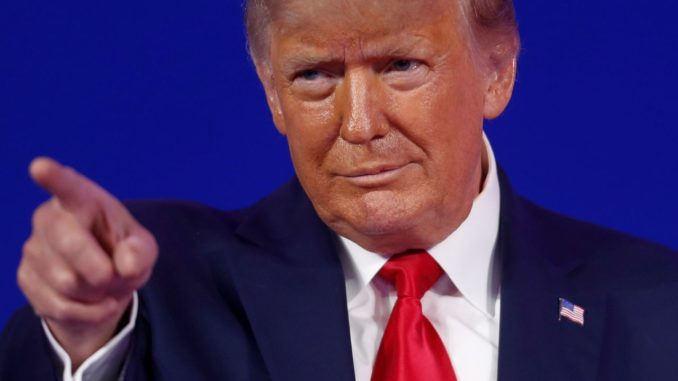
WASHINGTON (TIP): Former President Donald Trump took his fight with three massive tech companies to court, filing lawsuits that legal experts say are all but guaranteed to fail – even as they rally Republican voters, fundraisers and donors. Trump revealed Wednesday, July 7, that he is suing Facebook, Twitter and Google, as well as their respective CEOs Mark Zuckerberg, Jack Dorsey and Sundar Pichai, in class-action lawsuits.
Trump, who has a history of threatening legal action but not always following through, made the announcement at his golf club in Bedminster, New Jersey, alongside two leaders from the America First Policy Institute, the pro-Trump nonprofit group that is supporting the lawsuits.
Shortly after the news conference wrapped, Trump’s political entities started sending out fundraising messages that touted the lawsuits in their appeals for money. One such text message, written as if it were coming from Trump himself, includes a link to his joint fundraising committee Save America, which also raises money for other Republican political initiatives. The lawsuits were unveiled just over a month after Facebook decided to uphold Trump’s ban from using the platform until at least January 2023. Twitter, Trump’s preferred social media outlet throughout his one term in office, permanently banned him on the heels of the Jan. 6 invasion of the Capitol by a mob of his supporters. The lawsuit against Pichai also names as a defendant YouTube, the video-sharing website bought by Google in 2006. YouTube indefinitely banned Trump in January. “We’re not looking to settle,” Trump told reporters at Bedminster when asked about the lawsuits. “We don’t know what’s going to happen but we’re not looking to settle,” he said. The three related lawsuits, filed in federal court in Florida, allege the tech giants have violated plaintiffs’ First Amendments rights. The suits want the court to order the media companies to let Trump back on their platforms. They also want the court to declare that Section 230 of the Communications Decency Act, a piece of legislation that stops tech companies from being held liable for what users post on their platforms, is unconstitutional. As president, Trump railed against Section 230 and repeatedly called for its repeal. He even tied the issue to a crucial round of stimulus checks at the height of the coronavirus pandemic, as well as the passage of an annual defense spending bill. Legal experts doubt whether Trump’s latest attack on big tech companies will succeed.





Be the first to comment